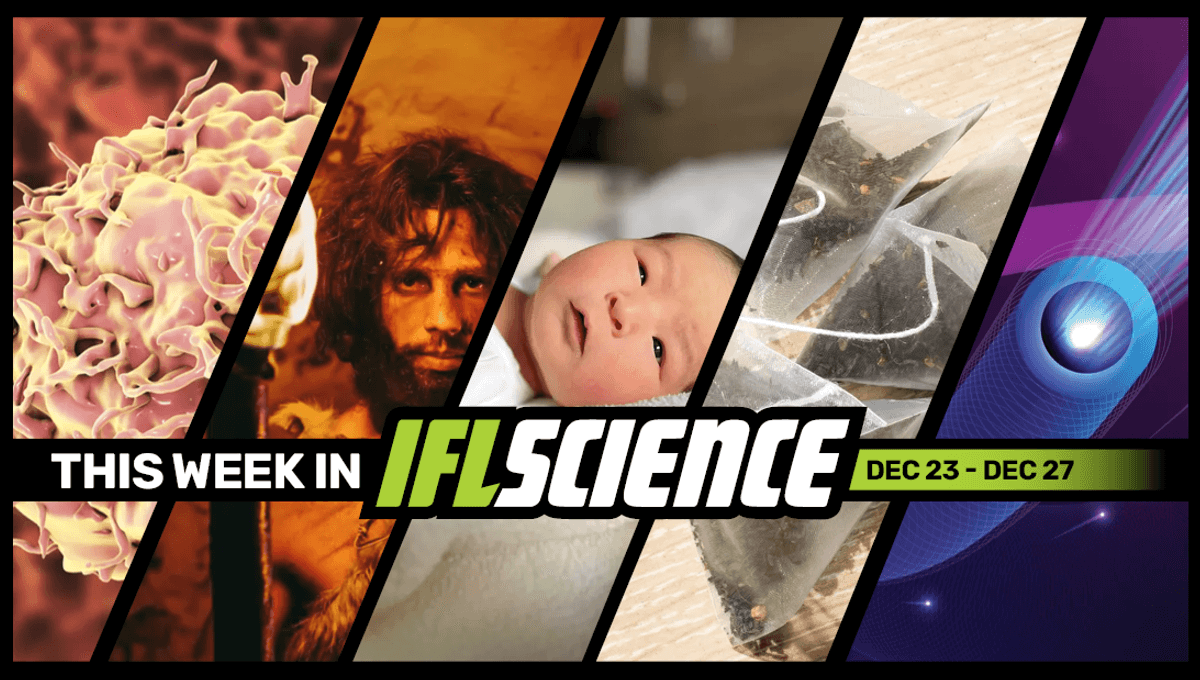
This week, a new discovery suggests Neanderthals may have mastered fire 270,000 years ago, for the first time, a baby conceived using a breakthrough IVF alternative has been born, and some teabags might be releasing millions of microplastics that could enter intestinal cells. Finally, we explore the biggest waterfall on Earth, which is surprisingly unimpressive and basically impossible to visit.
Subscribe to the IFLScience newsletter for all the biggest science news delivered straight to your inbox every Wednesday and Saturday.
Researchers Develop Groundbreaking Technology To Revert Cancer Cells Into Normal Cells
Researchers have developed a new groundbreaking technology that can convert some cancer cells into a state that resembles normal cells without killing them. This approach not only represents a new way to potentially treat cancer, but also one that avoids side effects produced by other treatments and the risk of resistance. Read the full story here
Neanderthals May Have Mastered Fire 270,000 Years Ago
A cave in France that was used by Neanderthals – or possibly their ancestors – may contain the oldest direct evidence of controlled fire use by humans in Europe. While it’s currently unclear exactly which species of ancient hominid lit these prehistoric campfires, the discovery suggests that our lineage had developed the ability to ignite flames at will by 270,000 years ago. Read the full story here
First-Ever Live Birth Of Baby Conceived Using Breakthrough IVF Alternative
Born in the Santa Isabel Clinic in Lima, Peru, a baby has been born using a new technique called Fertilo. This uses ovarian support cell (OSC) technology, which helps to mature eggs outside of the body. This breakthrough represents a monumental step forward in reproductive health, offering hope to individuals and families who face fertility challenges. Read the full story here
Some Teabags Release Millions Of Microplastics That Could Enter Intestinal Cells
New research has suggested that polymer-based tea bags could release micro- and nanoplastics into the bodies of consumers and the environment – however, the study shows not all tea bags are alike, even from a tiny sample. There’s no need to abandon your comforting cup, which may well be good for your health. On the other hand, the results may influence your chosen tea-delivery mechanism. Read the full story here
First Quantum Teleportation Over Noisy Internet Cables
Quantum teleportation has been demonstrated over a fiber optic cable carrying classical traffic (like the Internet) for the first time. The work suggests it will be possible to take advantage of the benefits quantum communication offers without needing to build a whole new infrastructure in parallel to what already exists. Read the full story here
TWIS is published weekly on our Linkedin page, join us there for even more content.
Feature of the week:
The Biggest Waterfall On Earth Is Visually Unimpressive And Basically Impossible To Visit
Where’s the world’s largest waterfall? Nope, it’s not Victoria Falls, as majestic as that is; neither is it Angel Falls, famously so tall that much of the water doesn’t even reach the bottom. In fact, it’s the Denmark Strait cataract – and while you won’t have seen any photos of it, and maybe haven’t even heard its name before, it’s actually larger than both those more famous falls put together. Read the full story here
More content:
Have you seen our e-magazine, CURIOUS? Issue 29 December 2024 is available now. This month we asked, “Why Is Laughter Contagious?” – check it out for exclusive interviews, book excerpts, long reads, and more.
PLUS, the We Have Questions podcast – an audio version of our coveted CURIOUS e-magazine column – continues. In episode 4, we ask “What Attacks You In The Most Remote Place On Earth?”
Season 4 of IFLScience’s The Big Questions podcast has concluded. To revisit all of season four’s episodes, click here.
Source Link: New Tech Could Reverse Cancer Cell Development, First Quantum Teleportation Over Noisy Internet Cables, And Much More This Week